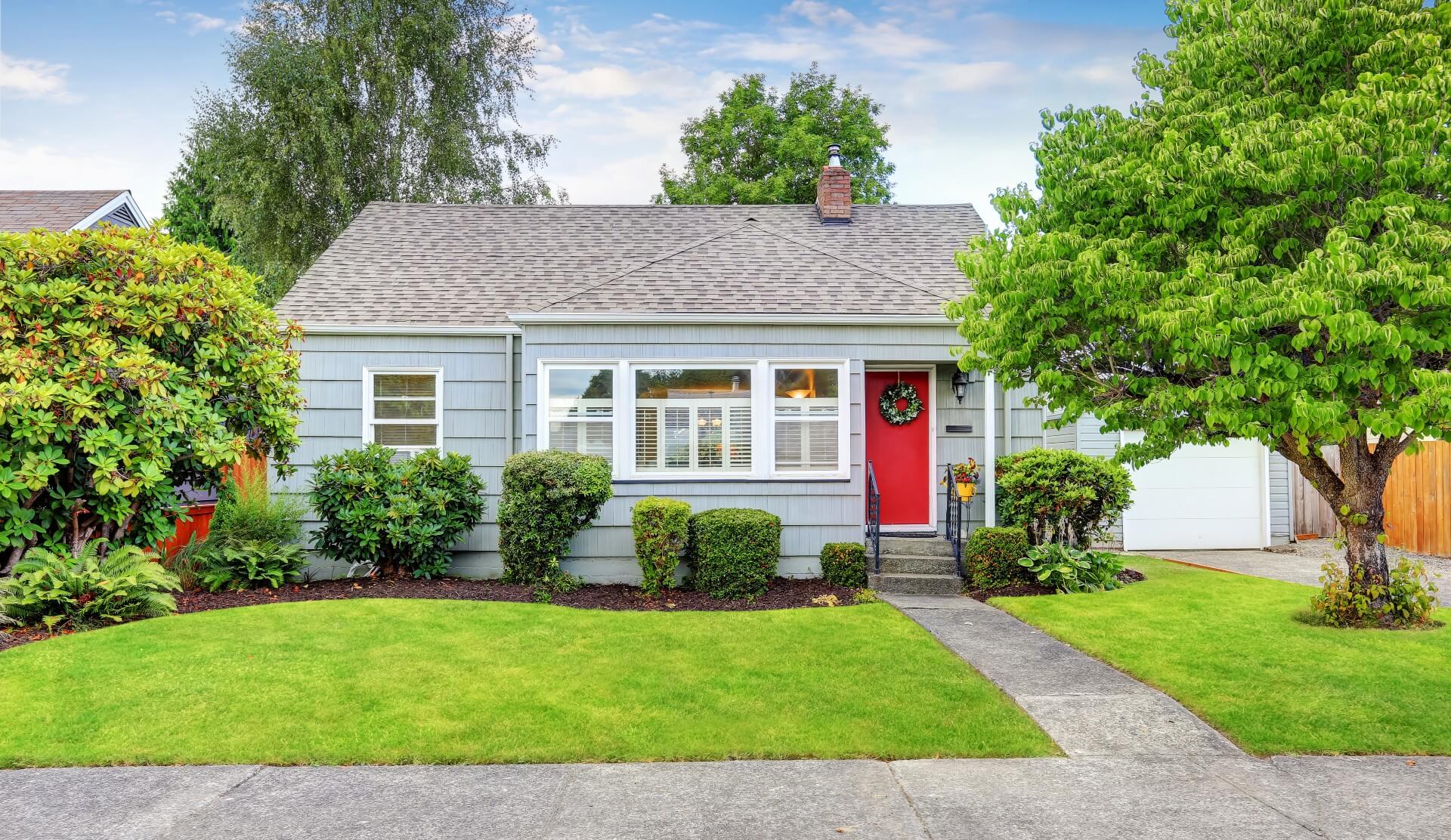
How Much Money Do You Need for a $300k House? Let's Break it Down
Posted on Apr 14, 2023
Over the past several years, the average cost of buying a home has skyrocketed in most areas of the...

Posted on Apr 14, 2023
We know how tempting it is to scroll through Zillow looking for houses. It’s like online dating, but for properties.
However, what you need to know before you “swipe right” and fall in love with a house is just how variable the costs can be. An interest rate of 6% vs 7% can add hundreds of dollars to your monthly mortgage payment. Similarly, the site’s mortgage estimate likely assumes you’re going to put down 20% - and if you’re going to only put down 5%, the numbers will look vastly different.
So what's the monthly payment on a $400k mortgage? Here's what you might end up paying.
The more money you put down, the less you owe - and the less the interest rate impacts you. Although the traditional advice is to put 20% down, realistically few buyers - especially first-time home buyers - can manage this today. The average for first-time buyers is actually 6%, and buyers can go as low as 3% depending on the loan they use.
It’s also worth noting that until you have 20% equity in your home, you’ll owe PMI (private mortgage insurance) which adds another $100-$200 to your monthly payment.
Note: average taxes + home insurance have been included in these monthly payments, and we've assumed buyers would opt for a traditional 30 year mortgage.
Down payment makes a big difference in what you pay month to month. As you can see, the difference between putting down the minimum (3%) and putting down the maximum (20%) is about $600 per month - that's huge. Once you get rid of the PMI (which will likely take a few years) the difference shrinks a bit.
It’s not necessarily the best idea to wait until you’ve saved 20%, though, because home prices tend to rise every year - and you might be able to get a better interest rate today. And the earlier you get into a home, the quicker you start building equity.
Resource: How Much to Put Down on a House: the Problems with 20%
If the house has been on the market for a while - or you end up requesting repairs and the seller would rather just discount the home’s price rather than deal with the request - then you might be in a position to get your $400,000 home for 2% off. Congrats on the deal! Here’s what that payment would look like.
So compared to the list price, you’d save about $50 per month. Not bad! In a competitive environment, though, asking for a discount may not be the best strategy - especially if the home is newly on the market.
The interest rate has been going up and down this year - and believe us when we say, it can make a huge difference in your monthly payment. Let’s take a look at how much you save if the interest rate drops.
As you can see, a 1.5% drop in the interest rate may not sound that significant, but it actually lowers the monthly payment by $300. The higher the loan amount, the more profound the savings are when you can score a lower rate.
Let’s go the other way, though, and see how this looks at 6% - a rate many buyers have seen in 2023.
A single .5% added $100 to the monthly payment. Over the lifetime of the loan, this definitely adds up.
It’s always worth keeping in mind that if the rate drops by a significant enough percentage, you can refinance your mortgage. Though this does come with a mortgage origination fee, you’ll typically be able to pay it off within 3 years - then reap the benefits thereafter.
As you can see, a $400,000 home can be affordable for one person but not another, even if they make the same salary - because depending on how much money they bring it the table, or the rate they receive, their monthly payment could look vastly different.
If you want to know what interest rate you qualify for (which likely won't be exactly the same as the national average), get in contact with a mortgage advisor - like ours. It's free and comes with no obligation - but they can help you figure out exactly what you can afford.
Spoiler alert: as you can probably guess from the above examples, the amount of money you need to buy a $400,000 home is going to depend on a lot of factors - like what monthly payment you’re comfortable with, and how much money you’re borrowing. So it'll be different for everyone.
However, we can determine a base minimum that will be true for many people.
First, you’ll need to pay for closing costs and homebuying fees. This is everything from the mortgage origination fee - which is typically 1% of the loan amount - to the home inspection, which will cost about $500.
On average, closing costs range from 3% to 6% of the loan amount. Obviously, that’s a huge range! One important factor is where you buy your home, because different states have different rules and standards.
If we assume that for a $400,000 home you put 3% down (the minimum - $12,000), then your range for closing costs would be $11,650 - $23,280.
So the absolute minimum you would need to bring to the table to buy a $400,000 home is $23,650. That's the minimum down payment + the minimum closing costs.
Keep in mind that it’s a terrible idea to spend every last penny on your home. Not only can unexpected costs pop up, but you also want enough cash on hand to cover unrelated expenses (like losing your job, or breaking your leg, or your refrigerator dying).
Most experts recommend having at least 3 months’ worth of living expenses saved up.
To cover your mortgage alone, you’d need at least $8,000 saved. Everyone’s additional monthly expenses (groceries, healthcare, etc) will look different, but assuming you could do it on twice the mortgage cost, that means you’d want $16,000 in the bank for expenses plus the $8,000 for mortgage.
So if you take the living expenses for three months, down payment, and closing costs altogether, you’d ideally buy your $400,000 home with at least $47,650 on hand.

Income is a big determinant of how much house you can afford - and how much you need to make will depend on several factors.
If you already have sizable monthly debt, for example (such as student loans, a car payment, etc) then your lender is going to approve you for a smaller loan amount. Similarly, if your credit score is lower than average, then the mortgage rate you receive will be higher - limiting how much you can borrow.
Here’s a few scenarios to help you understand.
Keep in mind that just because you can qualify, doesn't mean that you should buy a $400,000 home. If you make $65,000 before taxes, in most locations that will mean a post-tax income of less than $50,000 once taxes are removed. And many people are also contributing toward their 401k, which removes additional income.
A monthly payment of $1,850 could come close to half of your post-tax income, which many experts would not recommend so that you don't become "house broke."
Most first-time homebuyers can't put 20% down - so what's it look like if you go with the minimum?
We know that a lower interest rate makes it easier to borrow.
In this case, the interest rate dropping by 1.5% means that homebuyers could make almost $10,000 less and still afford the same home.
What happens if it goes up 1.5% instead?
In this scenario you'd need about $10,000 more in income to qualify.
Note: these monthly payments are based on averages and don’t take into account things like your employment status, credit history, existing debt, or specific property taxes. See more on that below.
A typical monthly mortgage payment includes both the money you pay to the lender as well as your home insurance and property taxes. Depending on where you live, your property taxes can vary from a few hundred dollars every year to potentially thousands.
Costs don’t just vary state by state - even neighborhood by neighborhood can see hundreds of dollars difference. For this reason it’s a good idea to work with a Realtor who can give you an accurate estimate based on where the house is located, because it will absolutely impact what you can afford.
Here are a few examples of just how different the tax rates can be for a $400,000 home:
In other words, there is no “one” income, down payment or mortgage rate that will allow you to buy a $400,000 home - it will really depend on a wide range of factors.
Whether or not you can afford a $400,000 home is going to depend on the interest rate you receive, your income, your down payment, and other factors like your local tax rate and potential HOA dues. As we've seen from the examples above, one family might be able to afford a $400,000 home while a similar family might not be able to.
The good news is that with time, you can work some of these factors to your advantage. Save up more for the down payment, and you won't owe as much interest or PMI every month. Or use your money to buy down your interest rate - again, making the monthly payment more affordable (don't forget, we give buyers $2,500 back at the closing table if they use us for mortgage and title).
Talk to a Realtor today to find out which homes you can afford - it's free, and there's no obligation!
Subscribe to our newsletter to get essential real estate insights.

Posted on Apr 14, 2023
Over the past several years, the average cost of buying a home has skyrocketed in most areas of the...

Posted on Apr 14, 2023
Often the first thing someone does when they think about buying a home is: scroll through Zillow or...

Posted on Apr 14, 2023
It’s a tough housing market for first-time homebuyers. Not only have home prices continued to...